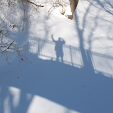Six years ago some of the Hispanic parishioners of St. Augustine parish performed a living stations of the cross. Because this sort of religious devotion is quite common in Latin America, watching it was both a religious experience and also a cultural experience. The re-enactment began on the steps of the church, where Pilate condemns Jesus to death.
 Stations three through nine took place on the walk to the site of the crucifixion.
Stations three through nine took place on the walk to the site of the crucifixion. The living stations of the cross have a long history, going back to the passion plays of the medieval period. After the Reformation, they died out in some parts of Europe.
The living stations of the cross have a long history, going back to the passion plays of the medieval period. After the Reformation, they died out in some parts of Europe. The final destination was the Susan lot that serves as a playground for the St. Augustine school children.
The final destination was the Susan lot that serves as a playground for the St. Augustine school children. This re-enactment was complete with the two thieves who were crucified with Jesus.
This re-enactment was complete with the two thieves who were crucified with Jesus. It took a lot of people to raise the cross.
It took a lot of people to raise the cross. And finally all the crosses are up.
And finally all the crosses are up. I thought the picture of with a truck carrying swimming pools made an interesting juxtaposition.
I thought the picture of with a truck carrying swimming pools made an interesting juxtaposition. A year of two later there was another performance of the living stations of the cross, but none has been done since then.
A year of two later there was another performance of the living stations of the cross, but none has been done since then.What the stations of the cross are to Lent and Easter, the creche is to Advent and Christmas. There are also re-enactments of the creche, but those are now more often done by Protestant denominations than by Catholics, which is rather ironic considering the history of the creche.
(No--I have not run out of Rensselaer churches to highlight on Sundays. There are still many more to do--check back next Sunday.)



No comments:
Post a Comment